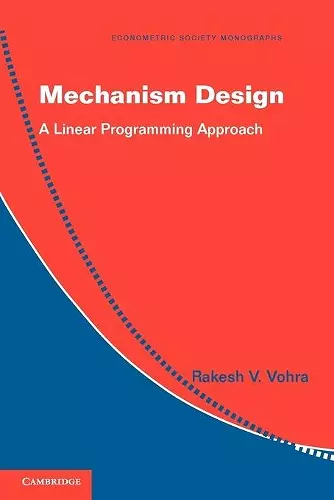Mechanism Design
A Linear Programming Approach
Format:Paperback
Publisher:Cambridge University Press
Published:9th May '11
Currently unavailable, and unfortunately no date known when it will be back

This book provides an account of the underlying mathematics of mechanism design based on linear programming.
Mechanism design is an analytical framework for thinking clearly and carefully about what exactly a given institution can achieve when the information necessary to make decisions is dispersed and privately held. This analysis provides an account of the underlying mathematics of mechanism design based on linear programming.Mechanism design is an analytical framework for thinking clearly and carefully about what exactly a given institution can achieve when the information necessary to make decisions is dispersed and privately held. This analysis provides an account of the underlying mathematics of mechanism design based on linear programming. Three advantages characterize the approach. The first is simplicity: arguments based on linear programming are both elementary and transparent. The second is unity: the machinery of linear programming provides a way to unify results from disparate areas of mechanism design. The third is reach: the technique offers the ability to solve problems that appear to be beyond solutions offered by traditional methods. No claim is made that the approach advocated should supplant traditional mathematical machinery. Rather, the approach represents an addition to the tools of the economic theorist who proposes to understand economic phenomena through the lens of mechanism design.
'The new book by Vohra is an excellent and most timely introduction into mechanism design. It offers a concise introduction to the theory of mechanism design, currently missing in the literature; it uses linear programming to great benefit to analyze the structure of incentives; and it provides a comprehensive account of the seminal results in auction and mechanism design. A splendid treatment for advanced undergraduate and graduate courses in economic theory!' Dirk Bergemann, Yale University
'Rakesh Vohra's exposition of the theory of mechanism design is wonderfully transparent and elegant. This short book equips the reader with a remarkably deep and comprehensive understanding of this important subject.' Tilman Borgers, University of Michigan
'Vohra convincingly demonstrates that linear programming can give a powerful and unified perspective on mechanism design, clarifying the ideas and methods underlying existing results, and leading in many cases to greater generality or new findings. Graduate students, researchers in other areas, and experienced mechanism designers will all benefit from this book, which will influence mechanism design research for years to come.' Andrew McLennan, University of Queensland
'Professor Vohra's rigorous text is unique in showing how numerous central results in mechanism design can be unified using the methodology of linear programming. His treatment is elegant and original, and it touches the most recent research frontiers.' Benny Moldovanu, University of Bonn
'Rakesh Vohra takes the reader from the basics of social choice theory and network flow problems to a deep understanding of optimal incentive systems for complex resource-allocation problems, using the mathematics of linear programming elegantly throughout the book.' Roger Myerson, University of Chicago and 2007 Nobel Laureate
'By situating the fundamental questions of social choice, incentive compatibility, and auction design within the theory of linear programming, Vohra is able to address the modern themes of mechanism design in a cohesive manner. The result is inspiring, enjoyable, and extremely compelling.' David Parkes, Harvard University
'This beautiful book provides an insightful and useful treatment of the fundamental theorems of social choice and mechanism design from the unifying and powerful perspective of linear programming. A terrific read covering a broad range of topics including a serious and rare treatment of multidimensional mechanism design.' Phillip J. Reny, University of Chicago
'The book does not assume any prior knowledge of mechanism design, but requires some familiarity with game theory, linear programming and convex analysis. As such, it is well suited to students and graduates of economic courses, but also to researchers and experienced mechanism designers.' Vangelis Grigoroudis, Zentralblatt MATH
ISBN: 9780521179461
Dimensions: 226mm x 152mm x 18mm
Weight: 270g
184 pages